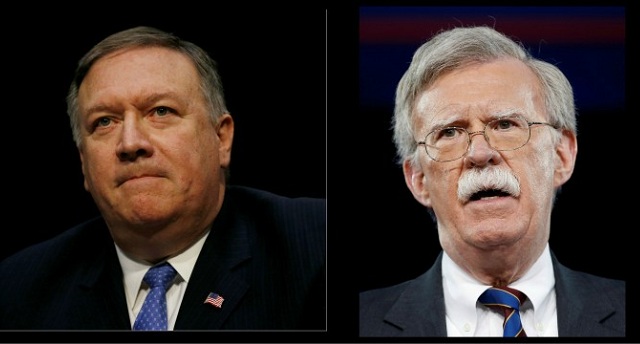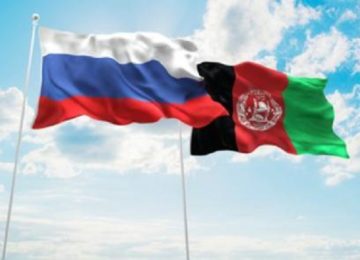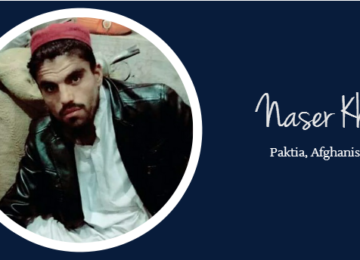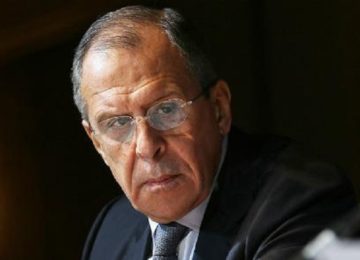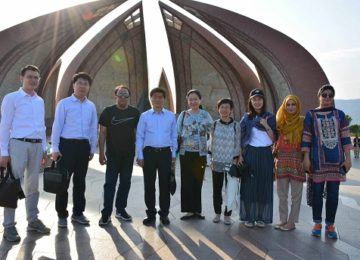Next week John Bolton will enter the White House as President Trump’s new national security adviser. Soon after, CIA Director Mike Pompeo who has been selected by President Trump to assume the role of secretary of state will be subjected to what is likely to be a close vote in the Senate Foreign Relations Committee (SFRC) and then move onto a Senate-wide vote regardless of the outcome in the SFRC. While Pompeo faces some challenges, he will likely become the next secretary of state and work closely with Bolton in advising the President on foreign policy, including Pakistan.
Pompeo is critical of Pakistan’s alleged safe-havens but his rhetoric does not diverge from the general trend of U.S. policy towards Pakistan under the Trump administration. Nevertheless, as the recent director of the CIA, Pompeo will enjoy close relationships inside the intelligence community while also serving as the public face of U.S. diplomacy, and this could lead to particularly hawkish policies. Tensions between Washington and Islamabad are already likely to rise with the designation of the Milli Muslim League as a terrorist organization which has increased the barriers to future U.S.- Pakistan cooperation. As Michael Kugelman wrote, “if the current US freeze on security aid to Pakistan is reversed, Washington may decide that action against LeT should indeed become a part of the certification process.”
John Bolton is known for his radical foreign policy, impenitent support for the Iraq war, and ardent advocacy for more U.S.-led regime change abroad. When examining Bolton’s policies, many of which contradict one another, it is important to consider his priorities. The sum of his statements and writing strongly indicate that he is focused on North Korea and Iran and has a preoccupation with the latter. In the past he has called for military action and regime change in Tehran. In a Fox News interview shortly before he was chosen as national security adviser, Bolton labeled Iran’s support for terrorism and its potential quest for nuclear weapons as the biggest threat to the U.S. Although he also considers Pakistan a significant threat to national security, confrontation with Iran will likely serve as the cornerstone of his foreign policy and this may prevent any significant change from the status quo in relations with Islamabad.
Bolton has shown a partiality for Pakistan’s military over its civilian government. In an interview during the Zardari administration he expressed support for General Musharraf and asserted that military rule is the most likely kind of government to bring about the changes the U.S. desires. According to Bolton, the military establishment has more “loyalty to the idea of Pakistan” than its civilian leaders. He added, “I would’ve kept Musharraf in power. I think the Bush administration made a mistake in pushing him out.” This was several years ago, and Bolton appears to have changed his position regarding Pakistan’s security establishment. Just last month Bolton accused Pakistan’s military intelligence of being controlled by radicals and he supports the Trump administration’s policy of cutting assistance to Islamabad.
While it is tempting to predict what policies Pompeo and Bolton will pursue, it is equally relevant to consider which ones they will reject. It is highly unlikely that they will seriously engage the Taliban in talks. Both Bolton and Pompeo fundamentally believe there is a military solution to Afghanistan and this makes them unlikely to prioritize political negotiations to end the conflict. They may be challenged by Secretary of Defense James Mattis and General Nicholson, however, Bolton and Pompeo will likely have greater access to the President. Negotiations with the Taliban are unlikely to bear fruit for multiple reasons but a decision to reject them before they even begin will amount to an enormous opportunity cost.
While Bolton has in the past expressed opposition to negotiations with the Taliban, he is not opposed to using diplomacy to influence other countries, such as China, to place pressure on Pakistan which he considers a primary enabler of the Taliban. However, such diplomatic pressure could prove difficult to muster if a decision to leave the Joint Comprehensive Plan of Action (JCPOA), also known as the Iran nuclear deal, alienates regional players such as China, Russia, and even India which is now using Iran’s Chabahar Port.
What will matter most in the coming months for U.S.-Pakistan relations is whether Pompeo and Bolton choose to focus on Iran and North Korea. A confrontational approach to Tehran will likely reduce some of the pressure on Islamabad in the short-term, but if this leads to a broader conflict it may reverberate inside Pakistan. Still, if Islamabad can demonstrate its seriousness in fighting the Haqqani Network then it is conceivable that Pompeo and Bolton will advise President Trump against further coercive actions. However, a prolonged conflict in Afghanistan combined with a potential increase in U.S. troop levels will only increase the likelihood of a diplomatic fallout in the future.
Adam Weinstein is a veteran of the U.S. Marine Corps, where he served in Afghanistan, and a policy research analyst. He tweets at @AdamNoahWho.



